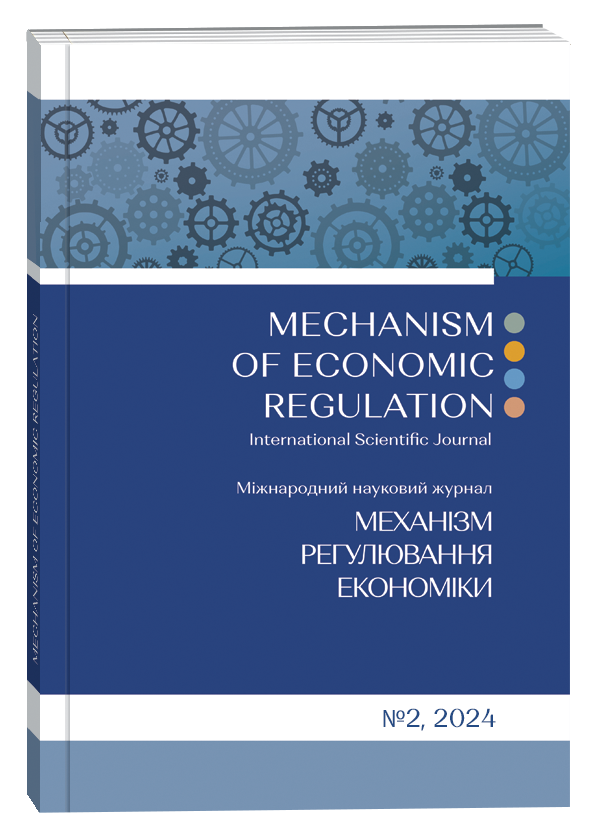СТАЛИЙ РОЗВИТОК ЯК СОЦІАЛЬНО-ЕКОНОМІЧНА МОДЕЛЬ «ВИГРАШ-ВИГРАШ»: КОНТЕКСТИ ОКРЕМИХ КРАЇН ТА РЕКОМЕНДАЦІЇ ДЛЯ УКРАЇНИ
Анотація
У статті досліджено виклики, з якими стикається сучасне суспільство щодо збалансованого розвитку, з урахуванням економічних, соціальних та екологічних аспектів. У цьому контексті концепція сталого розвитку виходить на передній план як соціоекономічна модель, спрямована на досягнення "виграшу-виграшу" для всіх учасників. В статті проаналізовано дослідження економістів щодо моделі сталого розвитку в різних соціоекономічних контекстах окремих країн, виокремлюючи значний внесок у цю сферу. Шляхом розгляду моделей розвитку спільнот, таких як "бочка", "лийка" та інші, а також шляхів синтезу елементів розвитку, поглиблено розуміння моделей розвитку спільнот та важливості синтезу елементів розвитку для досягнення сталості. Використання показників сталого розвитку також забезпечує, що розвиток є не лише економічно доцільним, але й соціально та екологічно відповідальним. Поглиблено розуміння моделей розвитку спільнот та важливості синтезу елементів розвитку в русі на шляху до сталого розвитку. Підкреслено значущість показників сталого розвитку як компоненту маркерів розвитку поселень, зокрема, питання доступу до базових послуг, охорони навколишнього середовища та соціальної справедливості.
Посилання
Буряк П.Ю., Дорошенко С.М. Програмно-цільовий метод як основа вдосконалення планування показників соціальної сфери. Науковий вісник НЛТУ України. 2010. Вип. 20.7. С. 84–91.
Бутенко А., Лазарєва Є. Програмно-цільове планування як механізм розв’язання проблем інноваційного розвитку економіки. Економіст. 2011. № 12. С. 4–8. URL: http://nbuv.gov.ua/UJRN/econ_2011_12_2
Кравців В., Павліха Н., Павлов В. Концептуальні засади розробки програми використання та охорони природно-ресурсного потенціалу регіону. Регіональна економіка. 2005. № 1. С. 107–115.
Хвесик М.А., Голян В.А. Інституціональна модель природокористування в умовах глобальних викликів: монографія. НАН України, Рада по вивченню продукт. сил України. Київ : Кондор, 2007. 480 c.
Chambers R. Participatory rural appraisal and the reversal of power. The Cambridge Journal of Anthropology, Berghahn Books. 1996. № 19(1). P. 5–23.
Daly H.E. For the common good: Redirecting the economy toward community, the environment, and a sustainable future Beacon Press. 1994. No. 73.
Damian M., Criqui P., Rousset N., Climat: COP27: how responsible are industrialised countries for climate change? The Conversation, November, 6. 2022.
Damian M. & De Paoli L. Climate change: back to development. Economics and Policy of Energy and the Environment. 2017. Vol. LIX. No. 3. P. 5–24.
Jacobs J. Systems of Survival: A Dialogue on the Moral Foundations of Commerce and Politics (Softcover). 1994. Vintage.
Buriak, P. Yu., & Doroshenko, S. M. (2010). The program-target method as the basis for improving the planning of indicators in the social sphere [Programno-tsіlovyĭ metod yak osnova vdoskonalennia planuvannia pokaznykiv sotsіal'noї sfery]. Naukovyi visnyk NLTU Ukrayny, 20(7), 84–91.
Butenko, A., & Lazareva, Ye. (2011). The program-target planning as a mechanism for solving problems of innovative economic development [Programno-tsіlove planuvannia yak mekhanizm rozv'iazannia problem innovatsiĭnoho rozvytku ekonomiky]. Ekonomіst, 12, 4–8. Available at: http://nbuv.gov.ua/UJRN/econ_2011_12_2
Kravtsiv, V., Pavlikha, N., & Pavlov, V. (2005). Conceptual foundations for the development of a program for the use and protection of the natural-resource potential of the region[Kontseptual'ni zasady rozrobky programy vykorystannia ta okhorony pryrodno-resursnoho potentsialu rehionu]. Rehіonal'na ekonomіka, 1, 107–115.
Khvesyk, M. A., & Holian, V. A. (2007). Institutional model of natural resource management in the face of global challenges: monograph [Instytutsiĭna model' pryrodokorystuvannia v umovakh hlobal'nykh vyklykiv: monohrafiia]. Kyiv: Kondor.
Chambers, R. (1996). Participatory rural appraisal and the reversal of power. The Cambridge Journal of Anthropology, 19(1), 5–23.
Daly, H. E. (1994). For the common good: Redirecting the economy toward community, the environment, and a sustainable future (No. 73). Beacon Press.
Damian, M., Criqui, P., & Rousset, N. (2022, November 6). Climat: COP27: how responsible are industrialised countries for climate change? The Conversation.
Damian, M., & De Paoli, L. (2018). Climate change: back to development. Economics and Policy of Energy and the Environment, 59(3), 5–24.
Jacobs, J. (1994). Systems of Survival: A Dialogue on the Moral Foundations of Commerce and Politics. Vintage.


